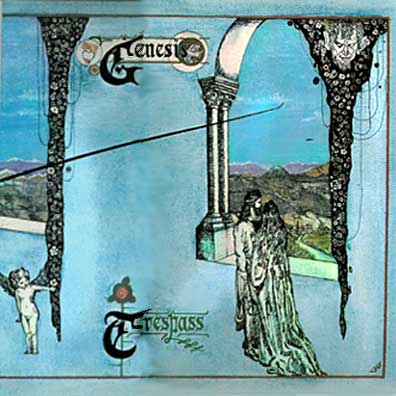
Trespass (1970)

1.Looking For Someone
2.White Mountain
3.Visions of Angels
4.Stagnation
5.Dusk
6.The Knife
After the commercially failed experiment of their first album, Genesis was faced with a common dilemma when such things happen. Keep going? Or go back to our old jobs? In their case, “old jobs” meant “school”. Let’s not forget how young they were. Of the five members, drummer John Silver chose the latter option, and is basically forgotten within the realms of music history. The other four guys ditch their label and promoter/manager, ditch their 3-minute pop-ditty style, and moved to Charisma records to be guided by Tony-Stratton Smith (not to be confused with latter day manager Tony Smith) for the next several albums.
The guys are now officially a “prog-rock” outfit. We are now introduced to albums with only six or seven songs with an average length of about eight minutes per track. See, back in the early seventies, you were “cool” if you did such things. Audiences dug you for being “different”. Well, Genesis would eventually be amongst the best of the best when it came to prog-rock, but this album shows they still have a long way to go and a lot of work to do. It’s not really a bad record. When you look at their limited experience, their youth, their sparse support, and the fact that they still had a couple of band members that would need replacing, one must come to the conclusion that what they produced is actually quite remarkable. Sadly, though, when compared against the body of their latter work, and when compared against their contemporaries, this one doesn’t really have that much about it that’s really memorable. The seams, unfortunately, show rather glaringly.
The first cut Looking For Someone is, in this reviewer’s opinion, the worst thing here. It epitomizes the band’s position when they recorded this album. It’s a long song, many different pieces intertwined, an attempt to sound progressive, yet it basically falls flat. Things would improve, however. The rest of the album features cuts where you can hear very strong parts within each tune, but when you record an eight-minute song, there are going to be a lot of “mini songs” within each song. A lot of changed tempos, a lot of solos, a lot of instrumental bits, etc. and I can’t honestly say that any of these songs are flawless throughout. Even the most memorable thing here, the closing cut The Knife has parts of it that don’t seem necessary, nor do they flow all that well.
Then, the production simply isn’t as strong either. This is one of those albums that if the band decided to rerecord several years later, it probably would have sounded much better. Not only were the band young and inexperienced, but it sounds like those twiddling the knobs in the control room were still wet behind the ears as well. This album features the band’s second drummer, (actually, the third if you count Chris Stewart who only recorded a few singles before their first album was released), John Mayhew, and it’s obvious that not much care went into his selection. Not only is he not that great, but his working class style is too radically different from the four public school boys he was playing alongside. Although the earlier albums usually featured the drums buried low in the mix, close listen reveals he’s only a fair player.
So an album that although not great, is probably as good as it could be based on all of the above limitations. It could have been much better, but you really can’t blame anyone.
Go back to the main page
Go To Next Review